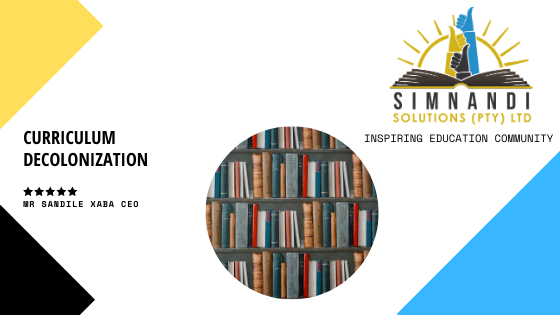Curriculum decolonization, from an African perspective, refers to getting rid of the curriculum procedures, values, norms, practices, thinking, beliefs and choices that makes education system Euro-centric instead of Afro-centric. The process of curriculum decolonization involves replacing irrelevant and unnecessary works from Europe or the global North with local theorists and African authors, and this is meant to prevent African universities, schools and colleges from becoming mere extensions of former colonisers. When a curriculum requires decolonization it means that the curriculum was designed on the footprints of the colonizers. The curriculum suited the plans and needs of the colonizers rather than of the people (the colonized). South Africa, like many other countries in Africa, was colonized and the colonizers offered the majority of south Africans an inferior education system that did not prepare our people for independence and freedom. The curriculum was designed to produce cooperative citizens, not independent people, it was designed to produce employees, not employers and it was designed to produce economic passengers, not economic drivers. This paper seeks to discuss two certain curriculum aspects that needs drastic transformation if we are to positively impact on education in South Africa: namely Language and Private-Public education quality balance.
Public schools in South Africa, in particular the former “Model C” schools situated in suburb areas should dump Afrikaans as a compulsory First Additional Language (FAL) after English Home Language (HL). Afrikaans serves no significance in the life of a south African child as many workplaces use English as the medium of instruction. Many countries, with various languages like Fiji, Venezuela, Singapore, Uruguay etc, communicate with the world through English for understanding, not Afrikaans. So, Afrikaans shouldn’t be the compulsory FAL language, there should be a range of languages (FAL) to choose from to avoid forcing Afrikaans as the only option for learners. That is the first decolonization that Personalized education curriculum system (PECS) deals with for the beneficiation of learners in South Africa. (refer to – https://simnandisolutions.co.za/2020/06/13/is-afrikaans-relevant/).
Learners in public schools should be given an opportunity to reasonably choose from African indigenous languages. Amongst other languages learners can choose form are international languages such as Portuguese, French, Spanish etc. These languages are important for public relations with other countries and for international job opportunities. Afrikaans doesn’t have that particular degree of significance to Africans. Swahili is one of the African languages widely spoken by many African countries, its introduction to schools would be of great importance in unifying Africans and stabilizing African relationships. That is why PECS believes it is vital for our curriculum to value African languages over Afrikaans. In concurrence to this argument is the Basic Education Minister, Angie in 2019 alluding of the same decolonization this paper is addressing. (https://businesstech.co.za/news/lifestyle/294654/minister-wants-to-decolonise-education-in-south-africa/)
Private education in South Africa is mostly and comfortably afforded by those who colonized South Africa and they send their children to private schools that offer better career relevant curriculum than public schools. That is why in most cases you barely find White learners of Afrikaner origin in public schools. Even the White teachers who teach in public schools do not enrol their children in those schools (where they work) they send them to “more white’’ schools. This should be a sign that there are existing curriculum inequalities within the education system of South Africa. How then do we decolonize the curriculum to accommodate majority of the people in a career relevant curriculum that promises the acquisition of skills and expertise of the desired career?
Personalized education curriculum system (PECS) will be the answer to dismantle the curriculum inequalities and decolonize it for everyone to receive quality education with quality career relevant curriculum delivered to them. PECS promises to personalize schools according to various careers. It believes in grouping learners separately rather than grouping them together. It advocates for theory and practical education for learners at a 50/50 scale. PECS believes in consulting the market (employers) to have an input in curriculum development in order to ensure and maintain relevancy between school training and the workplace. PECS is a huge enemy of mixture of subjects, learners are encouraged to do subjects that appeal to them and their careers.
Once the public schooling curriculum is structured in this order, it will bring back value and dignity of the majority of the people in our country. Learners will never see themselves as inferior to other learners who receive private education. PECS is a quality curriculum seeking to meet the needs of an individual learner. The curriculum is designed to cater for the unique talents and brilliance of an individual learner. This curriculum is an answer to all those who value education and value the dignity of the workforce of our nation. Personalized education can dismantle to curriculum injustices and decolonize our education system.
NB: Personalized education curriculum system(PECS) is explained in details here: https://www.youtube.com/watch?v=-tqofH2qkSU


